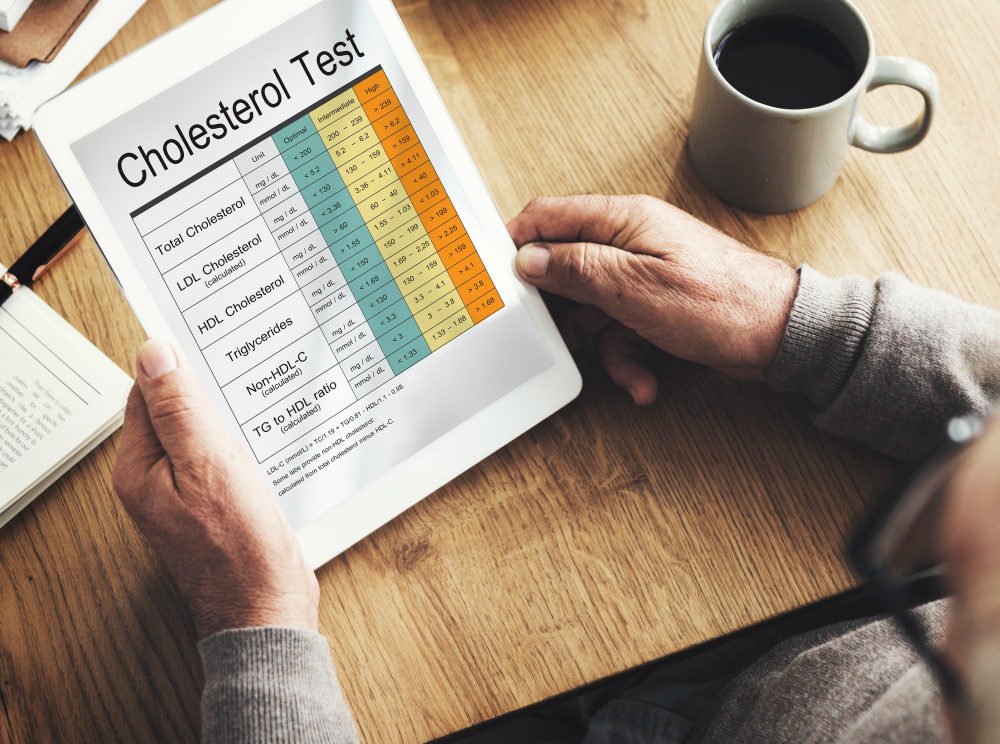One of the most common questions I often get from my patients is, “How do I read my cholesterol lab results?” Understanding your cholesterol values and how they play a part in your overall health is one of the many things I enjoy explaining. Knowing your cholesterol numbers and how to interpret them will give you a better idea of what changes you need or don’t need to make in regard to your overall lifestyle and diet.
What is a Cholesterol Test or Lipid Panel?
A cholesterol test, also known as a lipid panel, is a blood test used to measure cholesterol and fats in your blood. By analyzing the levels of cholesterol and triglycerides in your blood, a lipid panel test can help determine your risk of developing fatty deposits (plaques) in your arteries. This is a condition known as atherosclerosis.
Persistently high cholesterol levels can result in atherosclerosis. Atherosclerosis can result in significant negative long-term effects such as heart attack and stroke since blood flow to vital organs such as the heart and brain can become compromised.
What Does a Cholesterol Test/Lipid Panel Measure?
The Cholesterol test/Lipid panel measures four main types of cholesterol labs: HDL, LDL, triglycerides, and total cholesterol.
-
High-Density Lipoprotein or HDL level
High-density lipoprotein, or HDL, is a type of cholesterol often called “good” cholesterol. HDL carries excess cholesterol from your bloodstream to your liver, where it can be processed and eliminated from your body.
High HDL cholesterol levels can help clear out the harmful LDL cholesterol from your arteries. This can help maintain adequate blood circulation to your organs and lower your risk of long-term organ damage from things like heart attack and stroke.
-
Low-Density Lipoprotein or LDL Level
Low-density lipoprotein (LDL) is commonly called the “bad” cholesterol. LDLs are necessary for carrying cholesterol to your body’s cells for vital functions. However, having too much can lead to serious health problems. This is because having too much LDL in your bloodstream can cause it to aggregate in the walls of your arteries. This can in turn result in the build-up of plaque known as atherosclerosis. Atherosclerosis in your arteries can result in the compromise of blood flow to your vital organs over time.
-
Triglycerides
Triglycerides are a type of fat found in the body that can be used for energy. When we need energy, our body can utilize these triglycerides much like a car can utilize fuel for energy. When we eat too much food our body can store the extra calories we consume from this food as triglycerides for later use.
Years of research have shown that a high level of triglycerides on a lipid panel test is indicative of a higher risk of heart disease and stroke.
In addition, certain factors like uncontrolled diabetes, obesity, excessive alcohol consumption, and a high-calorie diet can all contribute to increased levels of triglycerides in your body.
-
Total Cholesterol
Total cholesterol is the sum of all types of cholesterol circulating in your bloodstream. It is calculated using the following formula:
HDL + LDL + 20% of triglycerides = total cholesterol
Knowing your total cholesterol level is important in assessing your overall risk for heart disease and other cardiovascular issues.
How do I interpret my cholesterol lab result numbers?
The normal range of cholesterol lab values described above are as follows:
Note that these are general guidelines, and individual optimal levels may vary depending on various factors such as age, gender, family history, and overall health.
-
HDL, LDL, and Total Cholesterol Test Results (mg/dl)
|
Types of Cholesterol |
Healthy Range |
At Risk |
Dangerous |
|
HDL |
60 and higher |
40 to 59 (male) 50 to 59 (female) |
Under 40 (male) Under 50 (female) |
|
LDL |
Under 100 |
100 to 159 |
160 and higher |
|
Total Cholesterol |
Under 200 |
200 to 239 |
240 and higher |
-
Trygliceride Test Results (mg/dl)
| Age | Optimal | Low Risk | Normal Risk | High Risk | Dangerous |
| 0-9yr | Below 75 | 75-99 | >99 | ||
| 10-18yr | Below 90 | 90-129 | >129 | ||
| >19yr | Below 100 | 100-129 | 150-199 | 200-499 | >499 |
What do the cholesterol lab values mean for my overall health?
Patients often ask me how to interpret their cholesterol lab results and if they should be worried about any elevated lab values.
The best way to know for sure if these lab values should be a cause for concern is to speak with a qualified medical provider. We can review your cholesterol values in relation to your lifestyle and any other medical conditions you may have to determine whether you should be concerned.
In addition, The American College of Cardiology/American Heart Association has developed a calculator known as the (ACC/AHA) CV Risk Calculator (2013) that may help predict your 10-year risk of heart attack, stroke, or death from cardiovascular disease.
While helpful, this calculator has several limitations and should only be used in conjunction with a discussion of your cholesterol lab results and risk factors with your doctor.
High cholesterol often has no symptoms, and regular testing is necessary to catch it early. If you are concerned that your cholesterol lab results are above the normal range and you would like to discuss them further, give our office a call to schedule a time to discuss them.
Dr. Sergio Guiteau is a physician who is board certified in Family Practice and Sports Medicine with added certifications in Aesthetic Medicine. He specializes in Preventive Medicine, Sports Medicine, and Anti-Aging Medicine and blogs on Advancedrejuv.com/blog

